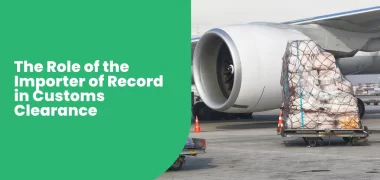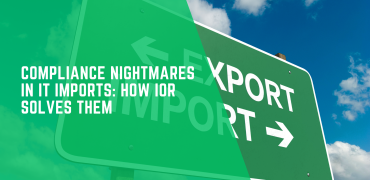In the intricate world of international trade, one key player ensures that goods move smoothly across borders: the Importer of Record (IOR). The role of the IOR is critical in customs clearance, bridging the gap between exporters and regulatory authorities. This blog post delves into the multifaceted responsibilities of the IOR, highlighting their importance in global trade and customs compliance.
Understanding the Importer of Record
The Importer of Record is a legal entity or person responsible for ensuring that imported goods comply with local laws and regulations. This role encompasses a variety of tasks, from handling documentation to ensuring that all duties and taxes are paid. The IOR can be the actual buyer of the goods, a customs broker, or a designated third party.
The Legal and Regulatory Responsibilities
Compliance with Import Regulations
The IOR is responsible for ensuring that all imported goods comply with the importing country’s regulations. This includes adhering to product standards, safety requirements, and labeling laws. Failure to comply can result in penalties, delays, or even confiscation of goods.
Accurate Documentation
Accurate and thorough documentation is crucial for customs clearance. The IOR must provide all necessary documents, such as commercial invoices, packing lists, and certificates of origin. These documents verify the nature, quantity, and value of the goods being imported.
Payment of Duties and Taxes
The IOR is liable for paying all applicable duties, taxes, and fees associated with the importation of goods. This responsibility includes calculating the correct amount owed and ensuring timely payment to avoid delays or legal issues.
The Process of Customs Clearance
Pre-Arrival Preparation
Before the goods arrive at the port of entry, the IOR must ensure that all documentation is in order. This preparation involves gathering necessary permits, licenses, and certificates required by the importing country.
Filing the Entry
Once the goods arrive, the IOR files an entry with the customs authorities. This entry includes detailed information about the shipment, such as the description of goods, their value, and the Harmonized System (HS) codes. Accurate HS codes are essential as they determine the duty rates and taxes applicable to the goods.
Customs Inspection
Customs authorities may inspect the goods to verify the accuracy of the documentation and ensure compliance with regulations. The IOR must be prepared to facilitate this inspection, providing access to the goods and any additional information required.
Release of Goods
After the inspection and verification process, and upon payment of all duties and taxes, customs authorities release the goods. The IOR is then responsible for arranging the final delivery to the consignee.
Challenges Faced by Importers of Record
Complex Regulatory Environments
Navigating the regulatory landscape of different countries can be challenging. Each country has its own set of rules and regulations, which can change frequently. The IOR must stay informed about these changes to ensure ongoing compliance.
Risk of Non-Compliance
Non-compliance with customs regulations can result in severe consequences, including fines, shipment delays, and reputational damage. The IOR must implement robust compliance programs to mitigate these risks.
Accurate Valuation of Goods
Determining the correct value of goods for customs purposes can be complex, especially when dealing with discounts, rebates, or other price adjustments. Incorrect valuation can lead to disputes with customs authorities and potential penalties.
Managing Documentation
The volume of documentation required for customs clearance can be overwhelming. The IOR must maintain organized records and ensure that all documents are accurate and complete.
The Benefits of Using an Experienced Importer of Record
Expertise in Customs Procedures
Experienced IORs have a deep understanding of customs procedures and regulations. They can navigate the complexities of customs clearance efficiently, reducing the risk of delays and penalties.
Streamlined Operations
By handling all aspects of customs clearance, the IOR allows the importer to focus on core business activities. This streamlines operations and ensures that goods reach their destination promptly.
Risk Mitigation
An experienced IOR can identify potential compliance issues before they become problems. This proactive approach minimizes the risk of non-compliance and associated penalties.
Cost Savings
While there are costs associated with using an IOR, the benefits often outweigh the expenses. An experienced IOR can help avoid costly delays, fines, and storage fees, ultimately saving money.
Conclusion
The role of the Importer of Record is vital in the customs clearance process. By ensuring compliance with regulations, managing documentation, and facilitating the smooth movement of goods, the IOR plays a key role in international trade. Importers who leverage the expertise of an experienced IOR can navigate the complexities of customs clearance more effectively, reducing risks and enhancing operational efficiency.
Understanding the importance of the IOR and the intricacies of their role can help businesses involved in international trade to better manage their import processes. As global trade continues to grow and evolve, the expertise and functions of the Importer of Record will remain essential to the seamless flow of goods across borders.




